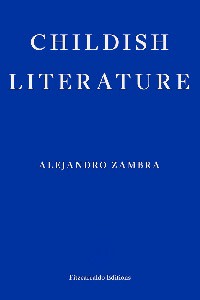Childish Literature — reflections on the joys and fears of parenting

Unlock the Editor’s Digest for free
Roula Khalaf, Editor of the FT, selects her favourite stories in this weekly newsletter.
The Chilean poet and novelist Alejandro Zambra first came to many readers’ attention with Bonsai (2006), his short, shape-shifting novel about an ill-fated love affair that is also an examination of the creative process. Childish Literature, his latest book, puts the experiences of fatherhood at its heart.
Although presented as fiction, Childish Literature is a miscellany of previously published texts — diary entries, essays, poems, short stories — orbiting around the theme of fathers and sons. In the opening piece, which gives the book its title, we find Zambra both elated and daunted as a rookie parent: “Your arrival forever changes . . . the meanings of all the words,” he writes to his newborn son.
He ponders his unpreparedness: “Our fathers tried, in their own ways, to teach us to be men, but they never taught us to be fathers. And their fathers didn’t teach them either. And so on.”
In “Jennifer Zambra” the author remembers his first date with his future wife, during which they discuss the name that his parents, who were expecting a girl, originally had in mind for him. “French for beginners” is about the ritual of reading stories to his child. “Trip and crawl” describes a magic mushroom trip that ends with the tenderest of paternal realisations: “My son was sleeping soundly as I told him, with my eyes, not to ever crawl, not to ever walk, that it wasn’t necessary: I could carry him in my arms his whole life.”

There are poems about being kept awake by his newborn, about his son learning to walk, and about the boy refusing to hit a piñata. “The kid with no dad” is a short story about a friendship that is broken and then repaired. “Skyscrapers” offers a glimpse of an aspiring writer’s uneasy relationship with the father that he resents and seeks approval from.
“What will my son remember of this horrible year,” Zambra asks in “Childhood’s childhood”, a meditation on the pandemic and on those moments of early childhood we have forgotten. “An introduction to football sadness” explores that most unperishable of bonds — shared loyalty to a football team: “For many of us, that part of our paternal inheritance was the only one we never questioned.”
In “Late lessons in fly-fishing” Zambra reflects movingly on his own father’s late-life interest — one that the author himself disparaged, opening up a rift that, now a father himself, he wishes to heal.
The book ends with a “Message to my son”, which pulls together the threads that bind this collection: “The idea that you will read, that you are reading this book right now, sometimes brings me overwhelming joy, and other times an emotion much more difficult to define.” Although the revelations of parenthood are a common theme in literature, it is Zambra’s juxtaposition of fatherhood and authorship that make this selection of texts memorable.
Happiness writes white, the saying goes. This is sometimes taken to mean that happiness can be difficult to articulate in writing. A less benign take is that writing about happiness is sentimental and, at its worst, boring. Zambra does a good job of keeping boredom at bay, even while describing the ennui of being a rookie father.
He grapples with the question of how to avoid sentimentality while writing about “the joyous and necessarily dopey satisfaction of watching a child learn to stand up or say his first words”. Readers may conclude that in the right hands — hands like Zambra’s, and those of his able translator Megan McDowell — “the mysteries of happiness” can also be rousing, poignant and thought-provoking.
Childish Literature by Alejandro Zambra, translated by Megan McDowell, Fitzcarraldo £12.99, 216 pages
Join our online book group on Facebook at FT Books Café and subscribe to our podcast Life & Art wherever you listen
#Childish #Literature #reflections #joys #fears #parenting




